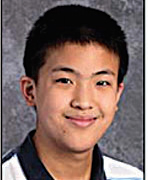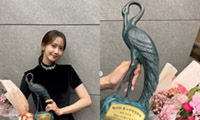Lessons from My Grandfather

Jeremy Kim Hunter College HS New York, NY 10th Grade
Once he told me about his experience as a soldier in the Korean War. “It all started when I was a young boy in Korea. It was after World War II had ended, and the country was in ruins. My family, like many others, was very poor. Korea was just beginning to recover from decades of harsh rule by Japan when the country was torn apart by a civil war between North Korea and South Korea. I remember the day when forces from the North invaded the South, and it quickly became a vicious conflict that engulfed the whole country.
“I was walking home from high school one day when some soldiers zoomed by in a jeep. The jeep screeched to a halt, and one of the soldiers asked me my age. I told him I was seventeen. Then, before I could think, he grabbed me by the collar of my shirt and shoved me in the truck. I was terrified. “The soldier said, ‘The country needs men for the Korean War.’”
As my grandpa spoke, the world around me seemed to dissolve from the living room of my grandpa’s house to a bleak, makeshift army camp. “I loathed the training camp I was sent to. Each morning I had to wake up so early. The drill sergeants barked their orders and put us through endless rigorous exercises to teach us to survive in the battlefield. I had to cover my face in mud so dirty that pigs would have felt right at home in it. My platoon had to crawl under endless fields of barbed wire. All I could see was a sea of sharp spikes.”
My grandpa continued, “After weeks of the horrendous drills and eating the mortifying food in the camp, I was fighting in the Korean War.”
My grandpa said dramatically, “We were thrust into combat in a field. As I kept my head low, I heard bombs exploding all around me. They shook so hard that I felt the earth was splitting open. Bullets also whizzed by like deadly missiles, inflicting mortal damage when they found their target. I burrowed down into the ground, where the dirt and mud got into my mouth, nose, and eyes.
“As I crawled out of the trenches,” my grandpa continued, “my eyes stung from the acrid smoke from the bombs that had exploded nearby. I also saw and smelled the rotting stench of the bodies of soldiers and civilians everywhere- in the fields, hills, and on the sides of the dirt roads. The battle was deadly but I had survived. One more day alive, and another day closer I was to seeing my family again.”
My grandpa continued on, “The conflict stretched out endlessly. After each side had some success in driving back the other side, the North and South sides became locked in a long-running stalemate. After what seemed like an eternity, a cease-fire was declared and the country was split along the 38th parallel, with a demilitarized zone created that remains to this day. The heavily fortified border is a stark symbol of the separation of Korea. Because no peace treaty was ever signed, the two Koreas technically remain in a state of war.”
Through my grandfather I have gained a strong sense of my heritage and the meaning of my identity as a Korean-American. I could empathize not only with my grandfather’s personal ordeal as a soldier, but also with the painful and tragic ordeal that the entire Korean people experienced through this conflict. I learned that many families were separated during the Korean War and could not see each other afterward, and that most of these families remain separated and each year the chances that these families will ever see each other again decreases as family members grow old and die.
It is in this context that I often think about what it means to be Korean-American living in the U.S. today. When I think of my grandfather’s history, I see and appreciate the connection between his roots in Korea, and my life today. It is often noted that Koreans are one people, united by a common language, history, and culture, and that it is a tragedy that South and North Korea remain separate. At the same time, tensions between the U.S. and North Korea are at a high point and there is increasing talk of war. As a Korean-American, I feel we can play a role to play in helping to find solutions and ease tensions, whether through working with elected officials or helping to facilitate the exchange of views between the different countries.
My grandfather passed away several years ago, at the age of 82. I am grateful that he shared so many of his stories with me while he was alive. These allowed me to have a strong personal bond with him, as well as a connection to my heritage and family history. Through my grandfather, I have gained a great sense of pride in being Korean American. Because of my grandfather, I am inspired to think deeply about my ethnic heritage and family history, and to be proud of my heritage and being a Korean American.
[경운장학회 영어웅변대회 Third place Winner]
<Jeremy Kim Hunter College HS New York, NY 10th Grade>
스마터리빙
more [ 건강]
[ 건강]이제 혈관 건강도 챙기자!
[현대해운]우리 눈에 보이지 않기 때문에 혈관 건강을 챙기는 것은 결코 쉽지 않은데요. 여러분은 혈관 건강을 유지하기 위해 어떤 노력을 하시나요?
 [ 건강]
[ 건강]내 몸이 건강해지는 과일궁합
 [ 라이프]
[ 라이프]벌레야 물럿거라! 천연 해충제 만들기
 [ 건강]
[ 건강]혈압 낮추는데 좋은 식품
[현대해운]혈관 건강은 주로 노화가 진행되면서 지켜야 할 문제라고 인식되어 왔습니다. 최근 생활 패턴과 식생활의 변화로 혈관의 노화 진행이 빨라지고
사람·사람들
more많이 본 기사
- 조지아서 역주행 승용차 덮쳐 한인 등 2명 사망
- 법무부, 엡스타인 자료 추가 공개… “전용기에 트럼프 8번 타”
- 박나래, 논란 또 추가..이번엔 ‘나혼산’ 조작 방송 의혹
- ‘헉’ 오바마케어 보험료가 연 4만불… 1
- 트럼프, GDP 호조에도 “금리 내려야…동의못하면 연준의장 안돼”
- 트럼프 “국가안보 위해 그린란드 필요…우리가 가져야”
- 中과 무역갈등 휴전한 美 “中반도체 추가관세 18개월간 보류”
- 임윤아, 여우 주연상 쾌거.. “멋진 상 감사합니다”
- 46회째 1등 안나온 파워볼 복권…당첨금 약 16억 달러로 껑충
- 美, 카리브해로 특수부대 전개…베네수 작전 개시 임박했나
- 닻올린 내란전담재판부 안착할까…尹측은 “위헌심판 신청”
- 워너브러더스 주주 “파라마운트 인수안 여전히 불충분”
- 특검, “국정농단” 건진법사 징역 5년 구형…김건희는 증언 거부
- ‘트롯돌’ 손태진, 오디션 우승상금 7~8억?.. “무서워서 1년 넘게 안 썼다”
- 트럼프, 美 3분기 깜짝성장 “관세 덕” 주장하며 대법원 압박
- 델라웨어 차량등록국서 총격…州경찰관 1명 사망
- 대법원 “최종심 나올 때까지 시카고에 주방위군 투입 안돼”
- 법무부, ‘반자동 소총 금지’ 워싱턴DC 상대 소송… “위헌”
- 이영지 맞아? 러블리 분위기 물씬..180도 달라진 ‘뼈말라’ 몸매
- ‘차량 링거’ 전현무 의료법 위반 고발당해… “적법한 진료” 해명
- “ATM기 사용하기 겁나네”
- 이번엔 ‘먹는 비만약’ 경쟁…알약 위고비, 미국서 판매 승인
- 9세 영 아티스트 박리하 ‘2026 LA 아트쇼’ 참가
- [새해 강화되는 노동법] 가주서 노동… 1
- 송성문, 메디컬테스트에 초긴장 “혹시 뭐 나올까 걱정했다→미국 열심히 갔는데 맨손으로 돌아올까봐”
- “美국방부, 中격납고에 ICBM 100기이상 장전돼 있을것으로 판단”
- ICE 홈디포 급습 한인 체포
- ‘K-도넛’, 남가주 진출·본격 확장
- 양민혁·배준호 등 병역특례 기대감 커졌다, 日 자국 아시안게임도 ‘U-21’ 참가
- 올해 워싱턴DC 식당 92곳 폐업…‘역대 최다’
- 악명 높은 갱단 연루 한인 기소
- 엔비디아칩 중국 밀반입?… “미국 정부, 싱가포르 업체 조사중”
- 1,480원까지 돌파한 환율… “내년에도 고공 행진”
- 美서 돌아온 푸틴 특사…러, 우크라 평화안 대응 촉각
- ‘올해는 ICE 이민자 체포 광풍의 해’
- 중국 시온교회 목회자 체포… 미주 한인교계 등 ‘기도와 지원’
- ‘남가주 사랑의 교회’ 이원준 담임목사 부임
- 베네수엘라 봉쇄에 금·은 값 또 최고
- ‘크리스마스 캐롤’과 산타 클로스 1
- 남가주 사랑의교회 노창수 목사 은퇴식
- [정재민의 미디어풍경] 적과의 동침, 협력하며 경쟁하기
- ‘연방하원 도전장’ 척 박 예비후보 후원모임
- AI로 가속화되는 노동시장 개편
- 에어프랑스 엔진 화재 5천피트 급강하 ‘아찔’
- 연말 여행객 최다… LAX 공항 ‘대혼잡’
- 워싱턴 일원서 600만명 장거리 여행 떠난다
- 4인 가족 보험료가 4만불까지… 중산층‘불안’
- 美·인니, 관세협정 모든 쟁점에 합의…내년 1월 양국 정상 서명
- 21년간 장학금 총 60만 달러 지급
- 2명에 모두 7,500달러 장학금
1/5지식톡

-
 미 육군 사관학교 West Poin…
0
미 육군 사관학교 West Poin…
0https://youtu.be/SxD8cEhNV6Q연락처:wpkapca@gmail.comJohn Choi: 714-716-6414West Point 합격증을 받으셨나요?미 육군사관학교 West Point 학부모 모…
-
 ☝️해외에서도 가능한 한국어 선생님…
0
☝️해외에서도 가능한 한국어 선생님…
0이 영상 하나면 충분합니다!♥️상담신청문의♥️☝️ 문의 폭주로 '선착순 상담'만 진행합니다.☎️ : 02-6213-9094✨카카오톡ID : @GOODEDU77 (@골뱅이 꼭 붙여주셔야합니다…
-
 테슬라 자동차 시트커버 장착
0
테슬라 자동차 시트커버 장착
0테슬라 시트커버, 사놓고 아직 못 씌우셨죠?장착이 생각보다 쉽지 않습니다.20년 경력 전문가에게 맡기세요 — 깔끔하고 딱 맞게 장착해드립니다!장착비용:앞좌석: $40뒷좌석: $60앞·뒷좌석 …
-
 식당용 부탄가스
0
식당용 부탄가스
0식당용 부탄가스 홀세일 합니다 로스앤젤레스 다운타운 픽업 가능 안녕 하세요?강아지 & 고양이 모든 애완동물 / 반려동물 식품 & 모든 애완동물/반려동물 관련 제품들 전문적으로 홀세일/취급하는 회사 입니다 100% …
-
 ACSL 국제 컴퓨터 과학 대회, …
0
ACSL 국제 컴퓨터 과학 대회, …
0웹사이트 : www.eduspot.co.kr 카카오톡 상담하기 : https://pf.kakao.com/_BEQWxb블로그 : https://blog.naver.com/eduspotmain안녕하세요, 에듀스팟입니다…
케이타운 1번가
오피니언
 조환동 / 편집기획국장·경제부장
조환동 / 편집기획국장·경제부장 AI로 가속화되는 노동시장 개편
 민경훈 논설위원
민경훈 논설위원‘크리스마스 캐롤’과 산타 클로스
 정재민 KAIST 문술미래전략 대학원 교수
정재민 KAIST 문술미래전략 대학원 교수 [정재민의 미디어풍경] 적과의 동침, 협력하며 경쟁하기
 김영화 수필가
김영화 수필가 [화요칼럼] 단호박의 온기
 김정곤 / 서울경제 논설위원
김정곤 / 서울경제 논설위원[만화경] 안중근의사 유해봉환 사업
 권지숙
권지숙 오후에 피다
 옥세철 논설위원
옥세철 논설위원말살되고 있는 유럽의 성탄절 전통, 그 원인은…

외로운 이웃들
 조지 F·윌 워싱턴포스트 칼럼니스트
조지 F·윌 워싱턴포스트 칼럼니스트 [조지 F. 윌 칼럼] MIT에 대한 트럼프의 무분별한 공격
1/3지사별 뉴스

‘연방하원 도전장’ 척 박 예비후보 후원모임
연방하원에 도전장을 낸 척 박(한국명 박영철) 예비후보 후원 모임이 지난 18일 열렸다. 척 박의 부친인 박윤용 뉴욕주하원 25선거구 (민주)…
‘경찰 무력사용지침 갱신 의무화’ 입법 초읽기

‘올해는 ICE 이민자 체포 광풍의 해’
올 한해동안 버지니아와 메릴랜드, DC 등에서 연방 이민당국에 체포된 사람이 1만명이 훌쩍 넘는 것으로 조사됐다. 또 미 전국적으로는 22만명…
“ATM기 사용하기 겁나네”

연말 ‘로드레이지’ 비극… 한인 총격 피살
연말을 맞아 도로 위에서 순간적으로 벌어진 운전 중 시비가 40대 한인 가장의 총격 피살 비극으로 이어졌다. 워싱턴주 레이시 경찰국과 서스턴 …
엡스타인 파일 공개 다음날 트럼프 사진 삭제…야당서 탄핵 경고

오늘 하루 이 창 열지 않음 닫기 





















































.png)


댓글 안에 당신의 성숙함도 담아 주세요.
'오늘의 한마디'는 기사에 대하여 자신의 생각을 말하고 남의 생각을 들으며 서로 다양한 의견을 나누는 공간입니다. 그러나 간혹 불건전한 내용을 올리시는 분들이 계셔서 건전한 인터넷문화 정착을 위해 아래와 같은 운영원칙을 적용합니다.
자체 모니터링을 통해 아래에 해당하는 내용이 포함된 댓글이 발견되면 예고없이 삭제 조치를 하겠습니다.
불건전한 댓글을 올리거나, 이름에 비속어 및 상대방의 불쾌감을 주는 단어를 사용, 유명인 또는 특정 일반인을 사칭하는 경우 이용에 대한 차단 제재를 받을 수 있습니다. 차단될 경우, 일주일간 댓글을 달수 없게 됩니다.
명예훼손, 개인정보 유출, 욕설 등 법률에 위반되는 댓글은 관계 법령에 의거 민형사상 처벌을 받을 수 있으니 이용에 주의를 부탁드립니다.
Close
x